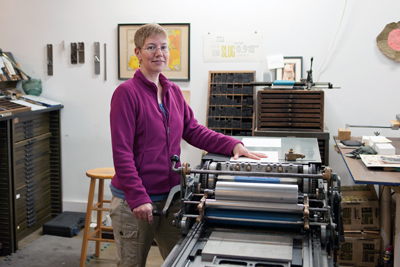
Jennifer Tappenden, a student in the Master of Fine Arts in Creative Writing program at UMSL and owner of Architrave Press, produced her first edition of individually printed poems at All Along Press, a cooperative print shop in St. Louis. (Photo by August Jennewein)
Poetry is a hard sell. It has the rap of being difficult, of being inaccessible, of being something only other poets read. No one knows this better than Jennifer Tappenden, a student in the Master of Fine Arts in Creative Writing program at the University of Missouri–St. Louis.
In addition to studying poetry, Tappenden is a public health researcher at the Washington University School of Medicine in St. Louis and founding editor of Architrave Press, an independent literary press that produces beautifully printed poems, which are sold individually.
In hindsight, Tappenden says she got her start with poetry in childhood.
“I loved Dr. Seuss and his musical language, but it wasn’t until I was in college that I realized I was a poet,” she says.
She has come a long way since that realization. In 2011, Slipstream Magazine nominated her poem “The Tooth Collector” for a Pushcart Prize, an annual literary award that honors the best writing published by small presses. She also was recently named UMSL’s first poet laureate.
“This is a great opportunity to reach people who otherwise wouldn’t read a poem on their own,” she says. “I’ll also be able to increase the visibility of UMSL’s MFA program whenever I give a reading or publish a poem. Since the position is new this year, there is a lot of room for creativity.”
The desire to get poetry in the hands of the general public is, in part, what drove Tappenden to establish Architrave Press. That and the physical experience of interacting with poetry.
“I love the process of reading manuscripts to find gems,” she says. “I love paper and ink, the nuts and bolts of how books are designed and manufactured.”
The way Architrave does business is similar to iTunes. The poems are printed on cardstock and sold individually or as a subscription, which allows the reader to receive the all of the poems in an edition. Tappenden produced the first edition, which included 11 poems, by setting each of the poems by hand using the lead monotype at All Along Press in St. Louis.
The second edition, which was released in early May, was designed digitally. Box Car Press in Syracuse, N.Y., made it into a photopolymer plate.
“The plate functions just like lead type in the press, so you get a letter-pressed product in a fraction of the time,” she says.
One of the missions of Architrave is to explore the beauty of a particular poem’s actual words as well as the beauty of the appearance of the words on the page. Tappenden says some people buy the poems simply as visual art.
The name of her press is also well designed. An architrave is the lowest level of a classical frieze, the piece that sits directly on the columns. It supports all of the art carved into the stone above at the same time that it holds open the space directly beneath, which is the door. Architrave Press aims to be a doorway for new readers to enter the world of poetry.
And the reaction to Tappenden’s venture has been overwhelmingly positive. Architrave was featured on the Poetry Foundation’s website in the fall, and the poems are sold at seven bookstores in the St. Louis area and at stores in Milwaukee and Memphis, Tenn.
“Best of all,” she says, “is the enthusiasm of other poets. The word ‘accessible’ has become an insult among poets, so I wasn’t sure many of them would want to be associated with a press that is openly courting a general reader. But it turns out there are lots of poets who support Architrave’s mission wholeheartedly. They appreciate both the poem-as-object and the attempt to reach the general literary reader.”
Tappenden says she hopes to consistently publish two editions a year until she’s an “old, old woman.”
“I hope that at least some of the poems I publish become common ground for general readers and poets,” she says. “And I hope someday to have a run of poems sell out before it’s published. That’s a pretty tall order, but a girl can dream.”
This story was originally published in the spring 2012 issue of UMSL Magazine.














